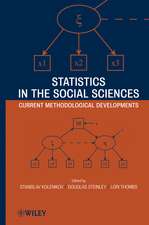Regression with Dummy Variables: Quantitative Applications in the Social Sciences, cartea 93
Autor Melissa A Hardyen Limba Engleză Paperback – 22 apr 1993
Din seria Quantitative Applications in the Social Sciences
-
 Preț: 306.08 lei
Preț: 306.08 lei -
 Preț: 270.02 lei
Preț: 270.02 lei -
 Preț: 270.25 lei
Preț: 270.25 lei -
 Preț: 274.06 lei
Preț: 274.06 lei -
 Preț: 270.29 lei
Preț: 270.29 lei -
 Preț: 304.51 lei
Preț: 304.51 lei -
 Preț: 304.83 lei
Preț: 304.83 lei -
 Preț: 313.80 lei
Preț: 313.80 lei -
 Preț: 305.60 lei
Preț: 305.60 lei -
 Preț: 304.77 lei
Preț: 304.77 lei -
 Preț: 306.14 lei
Preț: 306.14 lei -
 Preț: 273.46 lei
Preț: 273.46 lei -
 Preț: 275.42 lei
Preț: 275.42 lei -
 Preț: 277.33 lei
Preț: 277.33 lei -
 Preț: 305.05 lei
Preț: 305.05 lei -
 Preț: 271.10 lei
Preț: 271.10 lei -
 Preț: 270.63 lei
Preț: 270.63 lei -
 Preț: 305.05 lei
Preț: 305.05 lei -
 Preț: 304.51 lei
Preț: 304.51 lei -
 Preț: 305.28 lei
Preț: 305.28 lei -
 Preț: 270.40 lei
Preț: 270.40 lei -
 Preț: 305.60 lei
Preț: 305.60 lei -
 Preț: 304.77 lei
Preț: 304.77 lei -
 Preț: 306.14 lei
Preț: 306.14 lei -
 Preț: 306.34 lei
Preț: 306.34 lei -
 Preț: 305.40 lei
Preț: 305.40 lei -
 Preț: 306.41 lei
Preț: 306.41 lei -
 Preț: 304.77 lei
Preț: 304.77 lei -
 Preț: 305.60 lei
Preț: 305.60 lei -
 Preț: 304.51 lei
Preț: 304.51 lei -
 Preț: 269.91 lei
Preț: 269.91 lei -
 Preț: 270.40 lei
Preț: 270.40 lei -
 Preț: 269.91 lei
Preț: 269.91 lei -
 Preț: 289.18 lei
Preț: 289.18 lei -
 Preț: 287.82 lei
Preț: 287.82 lei -
 Preț: 316.12 lei
Preț: 316.12 lei -
 Preț: 288.96 lei
Preț: 288.96 lei -
 Preț: 316.71 lei
Preț: 316.71 lei -
 Preț: 314.98 lei
Preț: 314.98 lei -
 Preț: 317.26 lei
Preț: 317.26 lei -
 Preț: 314.60 lei
Preț: 314.60 lei -
 Preț: 289.95 lei
Preț: 289.95 lei -
 Preț: 289.18 lei
Preț: 289.18 lei -
 Preț: 315.36 lei
Preț: 315.36 lei -
 Preț: 314.98 lei
Preț: 314.98 lei -
 Preț: 314.38 lei
Preț: 314.38 lei -
 Preț: 316.33 lei
Preț: 316.33 lei -
 Preț: 316.51 lei
Preț: 316.51 lei
Preț: 315.53 lei
Nou
Puncte Express: 473
Preț estimativ în valută:
60.38€ • 63.20$ • 50.25£
60.38€ • 63.20$ • 50.25£
Carte tipărită la comandă
Livrare economică 31 martie-14 aprilie
Preluare comenzi: 021 569.72.76
Specificații
ISBN-13: 9780803951280
ISBN-10: 0803951280
Pagini: 96
Ilustrații: figs.tabs.
Dimensiuni: 140 x 216 x 6 mm
Greutate: 0.11 kg
Ediția:1
Editura: SAGE Publications
Colecția Sage Publications, Inc
Seria Quantitative Applications in the Social Sciences
Locul publicării:Thousand Oaks, United States
ISBN-10: 0803951280
Pagini: 96
Ilustrații: figs.tabs.
Dimensiuni: 140 x 216 x 6 mm
Greutate: 0.11 kg
Ediția:1
Editura: SAGE Publications
Colecția Sage Publications, Inc
Seria Quantitative Applications in the Social Sciences
Locul publicării:Thousand Oaks, United States
Cuprins
Introduction
Creating Dummy Variables
Using Dummy Variables as Regressors
Assessing Group Differences in Effects
Alternative Coding Schemes for Dummy Variables
Special Topics in the Use of Dummy Variables
Conclusions
Creating Dummy Variables
Using Dummy Variables as Regressors
Assessing Group Differences in Effects
Alternative Coding Schemes for Dummy Variables
Special Topics in the Use of Dummy Variables
Conclusions
Notă biografică
RESEARCH aND TEACHING INTERESTS
Quantitative Analysis Techniques, Longitudinal Methods; Aging & Social Change;
Public Policy and Aging.
Social Inequality, Social Sciences and Humanities Research Council of Canada. ¿Workforce aging in the new economy: A comparative study of information technology employment¿ (Julie A. McMullin, PI; Victor Marshall, Joann Marshall, University of North Carolina; Neil Charness, Florida State University). October 2002 ¿ September 2006.
Work and Retirement, including the influence of organizational incentives, pensions, family decision-making, health, job satisfaction; Public Policy, including Social Security, the Age Discrimination and Employment Act, the Employee Retirement Income Security Act, Medicare and Medicaid; Political Attitudes, including analysis of social change and individual aging; Women¿s Issues and Aging, including poverty and financial security, caregiving, long-term care, intergenerational assistance, and health; Cognitive Components of Saving and Investment behavior, including planning horizon, discounting, risk tolerance, deferred gratification; Older Workers, including training, displacement, work schedules, job demands, organizational incentive structures.
Descriere
It is often necessary for social scientists to study differences in groups, such as gender or race differences in attitudes, buying behavior, or socioeconomic characteristics. When the researcher seeks to estimate group differences through the use of independent variables that are qualitative, dummy variables allow the researcher to represent information about group membership in quantitative terms without imposing unrealistic measurement assumptions on the categorical variables. Beginning with the simplest model, Hardy probes the use of dummy variable regression in increasingly complex specifications, exploring issues such as: interaction, heteroscedasticity, multiple comparisons and significance testing, the use of effects or contrast coding, testing for curvilinearity, and estimating a piecewise linear regression.












